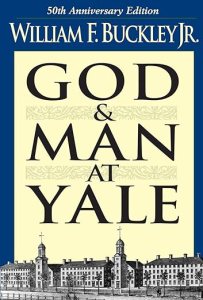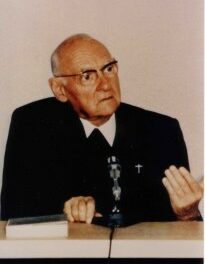We support our Publishers and Content Creators. You can view this story on their website by CLICKING HERE.
William F. Buckley did not resist the ideas of collectivism as successfully as he thought. Instead, he chose to aim for winning a contemporary battle rather than defending the Permanent Things. Conservatives today would do well to guard against falling into the same trap.
 William F. Buckley’s God and Man at Yale is one of the classics of conservatism. Written in 1951 during the Cold War, the book is very much a product of its time and is primarily concerned with winning the battle against communism for the minds of America’s youth. Nevertheless the book has much to say that is still of value in an age in which the battles over school curricula and free speech on campus are as fierce as ever. The young Mr. Buckley also takes us back to the early days of the postwar American conservative intellectual movement and allows us to see how some American conservatives viewed themselves and their world.
William F. Buckley’s God and Man at Yale is one of the classics of conservatism. Written in 1951 during the Cold War, the book is very much a product of its time and is primarily concerned with winning the battle against communism for the minds of America’s youth. Nevertheless the book has much to say that is still of value in an age in which the battles over school curricula and free speech on campus are as fierce as ever. The young Mr. Buckley also takes us back to the early days of the postwar American conservative intellectual movement and allows us to see how some American conservatives viewed themselves and their world.
Mr. Buckley, who had just graduated from Yale when he wrote God and Man back in 1951, was disturbed by what he perceived as his alma mater’s failure to impress upon its students a respect for religion, capitalism, and individualism. On the contrary, he found that the university’s professors were more likely to teach atheism and collectivism. Buckley realized that students’ minds are not entirely blank slates. Most young people come to the university with a good grounding in the basic values they will carry with them for life. But he was concerned about the fate of those students whose faith in God or individualism may have been wavering or in need of encouragement.
Anyone whose faith needed encouragement certainly was not going to find it at the Yale described by Buckley. Most of the professors and textbooks regarded Christianity derisively as a prescientific superstition. Even in the Department of Religion, Buckley found that the Bible was treated merely as a work of ancient literature and many of the department’s professors were professed agnostics. As far as individualism goes, most of the economics professors at Yale and the textbooks they employed, according to Buckley, considered capitalism outdated. Collectivism was the way of the future.
But, you ask, what about academic freedom? Shouldn’t professors be allowed to teach whatever they want in the manner they think most appropriate? There is no such thing as academic freedom, answered Buckley. All universities discriminate in the hiring of faculty. No reputable school, for instance, would hire someone to teach geography who believed the earth to be flat. Since schools already denied academic freedom to those whose ideas were factually wrong, Buckley argued that it would be no further infringement of academic freedom to refuse to hire those whose ideas or values were contrary to those of the community the university served.
Critics might see in this the potential for a dictatorial university administration tyrannizing over the faculty and enforcing ideological conformity on the entire university community. Not Buckley. He failed to see why anyone should assume that the administration would misuse its power. Just as, he said: “I fail to see why there is reason to believe that the wide powers conferred by the Constitution on the Congress of the United States will inevitably be misused. Ultimately we are all at the mercy of the collective action of men. There is no alternative to faith that men will act reasonably. If pessimism about this prevailed, societal life would be impossible.”
Herein is the problem with this otherwise fine book. Buckley apparently did not resist the ideas of collectivism as successfully as he thought. If that statement is not an endorsement of collectivism, I do not know what is. In that one brief statement Buckley made the case for the desirability of a strong central government, a generous interpretation of the powers conferred by the Constitution on Congress, and collective action for the good of society. “If pessimism about this prevailed, societal life would be impossible,” he said in contradiction to the ideals he argued for in most of his book. James Madison is a better guide to conservative principles. In Federalist #51, Madison wrote, “If angels were to govern men, neither external nor internal controls on government would be necessary.” Since, alas, we have not found angels to govern us government must be controlled by both external and internal checks. Buckley would have done better to have focused on basic conservative principles such as tradition, faith, family, limited constitutional government, and distrust of centralization. Instead, he chose to aim for winning a contemporary battle rather than defending the Permanent Things. Conservatives today would do well to guard against falling into the same trap.
This essay was first published here in July 2017.
The Imaginative Conservative applies the principle of appreciation to the discussion of culture and politics—we approach dialogue with magnanimity rather than with mere civility. Will you help us remain a refreshing oasis in the increasingly contentious arena of modern discourse? Please consider donating now.
The featured image is courtesy of Pixabay.
Share This Story, Choose Your Platform!
Go to Top

 Conservative
Conservative  Search
Search Trending
Trending Current News
Current News 







